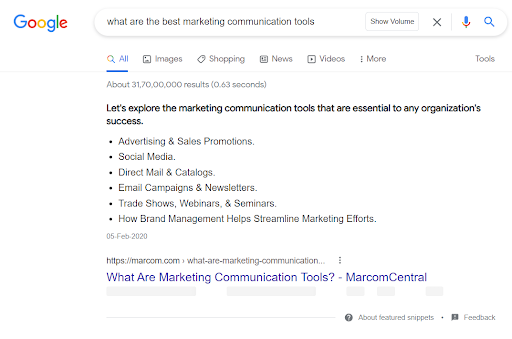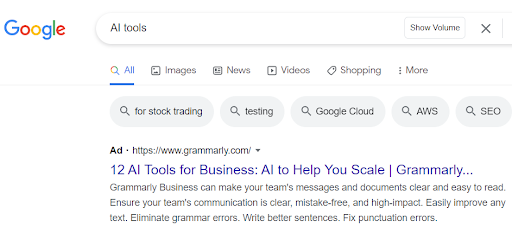SEO vs. PPC: Which Should You Implement?
SEO vs PPC ads? Most businesses should invest in both. When implemented together, SEO strategies and PPC ads can help you attract more visitors, get more leads, and close more sales.
In the business world, where measurable marketing campaigns and clear results matter, the debate between investing in SEO or paid advertising techniques such as PPC is more relevant than ever.
The question of which is better – SEO or PPC ads– plagues marketing teams. The answer, however, isn’t very clear.
To help you make sense of this question, we’ve put together a guide that covers the pros and cons of both SEO and PPC. By the end, you should have a better understanding of which digital marketing strategy is right for your business.
Need help selecting a company?
Based on your budget, timeline, and specifications we can help you build a shortlist of companies that perfectly matches your project needs. Get started by submitting your project details.
SEO vs. PPC Ads: What Are They and How Do They Work?
While SEO attracts organic traffic, PPC ads are a paid strategy to attract website traffic. Learn more about how these strategies differ and how they can be used together.
What is SEO?
SEO is the process of optimizing your website in order to rank higher in search engine results pages (SERPs) without paying for advertising.
Content ranking at the top of SERPs earn more traffic. In fact, the number one spot on SERPs earn about a third of all clicks.
This increases traffic to the site, resulting in more leads and potential revenue. As a result, how a site ranks on SERPs can have a big impact on a business’s bottom line.

SEO includes on-page and off-page marketing tactics, such as:
- keyword research
- link building
- content optimization.
When done correctly, SEO can be a powerful tool for growing your website’s traffic.
Search leading SEO Companies on Top Design Firms.
What is PPC?
PPC, on the other hand, refers to using paid promotional tools, such as pay-per-click (PPC) ads, to boost your website’s visibility on search results pages.
PPC ads are displayed at the top of SERPs, above the organic results. The increased visibility makes them more likely to be clicked on.

They’re usually labeled as “sponsored” or “ad” to help users differentiate them from organic listings.
Now that we’ve looked at the difference between SEO and PPC, let’s take a closer look at the pros and cons of each.
Find a leading PPC Company on Top Design Firms.
The Pros and Cons of SEO vs PPC Ads
As you learn about the benefits and disadvantages of organic vs paid marketing, you'll better understand what they do and when you should leverage them.
The Pros of SEO:
- Creating helpful blog posts, articles, and thought leadership content makes you more credible and trustworthy in the eyes of users. By establishing authority on a topic, search engines will rank you higher.
- Lower cost in the long run. For many businesses, paying for ads for years is not a sustainable or sensible way to grow. If you want to keep your marketing expenses down, you should focus on SEO and content marketing tactics.
- Increased brand awareness and reach. Well-executed SEO can help you attract new users, even if they don’t click on your website immediately. The more times your brand appears in SERPs, the more likely users are to remember it.
The Cons of SEO:
- While organic marketing is reliable over the long run, it has its problems. Here are some of the biggest issues companies face:
- It takes longer to see results. Unlike PPC ads, which can start generating traffic to your website almost immediately, it can take months or even years to see the results of your SEO efforts
- More difficult to track ROI. Because SEO takes time to produce results, it can be difficult to track the return on your investment. Content creates results through multiple channels and in different time frames. It's not possible to track the exact way your efforts pay off.
- Competitors can easily outrank your content. If your competitors are using the same keywords as you and have a higher Domain Authority (DA), they may be able to outrank you in SERPs, even if your content is better.
- You're subject to algorithm changes. Google constantly changes its algorithms, which can impact your website's positioning for different keywords. If you're not on top of these changes, you could see a sudden drop in traffic.
The Pros of PPC Ads:
PPC comes with a number of advantages, including:
- Immediate results. Once your ad is live, it will start generating traffic to your website right away.
- You have more control over your results. With PPC ads, you can control who sees your ad, when they see it, and how often they see it. You can also target a specific location or demographic.
- It's easier to track ROI. Because you're paying for your results, it's easier to track the return on your investment.
- You can test different messages and strategies and quickly see what works and what doesn't, helping you optimize your ads.
The Cons of PPC Ads:
While you get immediate results with PPC, it’s not the best option for some businesses. Here’s why:
- PPC ads are expensive. In order to see results from your PPC ads, you need to be willing to spend money. Depending on your industry and the keywords you're targeting, you could end up spending a lot of money.
- You need to monitor your ads constantly. Once your ad is live, you need to keep watching it to make sure it's performing well. If it's not, you need to make changes to improve your results immediately or you stand to lose money and the opportunity to convert visitors to customers.
- There's no longevity. Once you stop paying for your ad, it will no longer appear in SERPs. This means you need to constantly be willing to spend money on PPC ads to see results.
When Should You Use SEO vs. PPC Ads?
So, we're down to the big question: when should you use SEO vs PPC ads?
The answer is: it depends.
There are a number of factors you need to take into account when deciding which approach to take, including:
- Your budget. How much money can you spend on marketing? If you have a limited budget, you may want to focus on organic SEO.
- Your timeline. How quickly do you need to see results? If you need to generate traffic quickly, you may want to focus on PPC ads.
- Your goals. What are you trying to achieve with your marketing? If you're looking to build brand awareness or get in front of a large audience, SEO may be a better option. But if you want to sell time-sensitive products, then you need to use ads.
- Your competitors. What is your competition doing? If they're investing heavily in PPC ads, you may need to do the same to stay competitive.
- Your ability to create great content. Creating high-quality content is essential for both SEO and PPC ads. If you don't have the time or ability to create great content, you may want to invest in PPC ads.
There isn’t a one-size-fits-all answer to the question of which is better. In general, leverage ads if you want immediate results and have the budget to scale quickly.
And focus on organic content marketing and SEO to not just find customers now but also in the future from a piece of content you create today.
Making SEO and PPC Ads Work Together
You should know that SEO and advertising are not mutually exclusive marketing activities. They can benefit each other.
How?
While working on your content marketing and search optimization effort, you'll find better keywords with lower competition to use in your PPC ads. You'll save money, get more relevant leads, and drive up conversions.
And secondly, PPC can help you improve your SEO by driving more traffic to your website, building quick brand awareness, and helping you test different keywords and landing pages.
It's important to simultaneously work on both your SEO and your PPC ads to make the most of your marketing budget and get the best results for your business.
When done correctly, SEO and PPC ads can create a virtuous circle that helps you attract more visitors, get more leads, and close more sales.
Additional reading
Need help selecting a company?
Based on your budget, timeline, and specifications we can help you build a shortlist of companies that perfectly matches your project needs. Get started by submitting your project details.